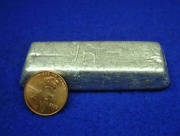Difference between revisions of "Indium"
Jump to navigation
Jump to search
(username removed) |
|||
| Line 2: | Line 2: | ||
== Description == | == Description == | ||
| − | A soft, malleable, silvery-white metallic element. Indium occur naturally in [ | + | A soft, malleable, silvery-white metallic element. Indium occur naturally in [[zinc]] blende ores, such as [[sphalerite]], and in [[tungsten]], [[tin]], and [[iron]] ores. It was discovered in 1863 by Reich and Richter. Indium has an abundance of 0.00001 % in the earth's crust. Indium is stable in air and is diamagnetic. It used as a plating over silver mirrors, in dental alloys, in semiconductors, and in nuclear reactor control rods. |
== Synonyms and Related Terms == | == Synonyms and Related Terms == | ||
Revision as of 13:54, 16 January 2014
Description
A soft, malleable, silvery-white metallic element. Indium occur naturally in Zinc blende ores, such as Sphalerite, and in Tungsten, Tin, and Iron ores. It was discovered in 1863 by Reich and Richter. Indium has an abundance of 0.00001 % in the earth's crust. Indium is stable in air and is diamagnetic. It used as a plating over silver mirrors, in dental alloys, in semiconductors, and in nuclear reactor control rods.
Synonyms and Related Terms
In; indio (It., Esp.); Índio (Port.)
Other Properties
Flame color is deep blue. Softer than lead and leaves a mark on paper.
| Composition | In (atomic no. 49) |
|---|---|
| CAS | 7440-74-6 |
| Mohs Hardness | 1.2 |
| Melting Point | 156.4 |
| Density | 7.3 |
| Molecular Weight | atomic wt = 114.76 |
Hazards and Safety
Flammable solid. Hygroscopic. Contact may cause irritation.
Fisher Scientific: MSDS
Additional Information
Web Elements: Website
Authority
- The Merck Index, Martha Windholz (ed.), Merck Research Labs, Rahway NJ, 10th edition, 1983 Comment: entry 4980
- The American Heritage Dictionary or Encarta, via Microsoft Bookshelf 98, Microsoft Corp., 1998
